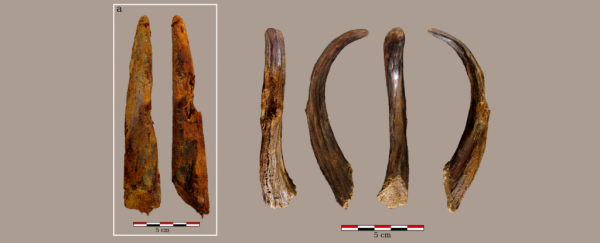Archaeological excavations in Northern Spain have turned up something incredible. Two wooden tools that, at 90,000 years old, are the oldest of their kind ever found.
What's especially cool is that these tools weren't made and used by Homo sapiens, but our older cousins - Neanderthals.
The Aranbaltza site on the Iberian Peninsula hosted several Neanderthal occupations over the millennia, according to researchers from the Spanish Centro Nacional de Investigación sobre la Evolución Humana (CENIEH).
Included in the sediment were two wooden tools. Luminescence dating on the mud in which they were found, dated these items back tens of thousands of years, to the Middle Palaeolithic, a time in which Neanderthals inhabited Europe.
The tools are a wonderful rarity. Wood is an organic material that decomposes, so wooden tools linked to early human history are often lost to the ravages of time.
In fact, they are only preserved in very specific environments - such as the the waterlogged sediments of Aranbaltza.
Only one of the two recovered tools was the subject of analysis and study by a team led by CENIEH archaeologist Joseba Rios-Garaizar.
Wear on its tip produced by repeated mechanical stress indicates that it was used for tasks like digging up food, such as tubers and clams; digging up stones; or making pits for fires.
"The few available direct and indirect lines of evidence suggest that wood played a significant role in Neanderthal technological adaptations," the researchers wrote in their paper.
"Wood provides enough plasticity to shape a varied array of tools that are impossible to obtain through the use of stones, and very difficult to obtain with bones, which have constrained sizes and are more difficult to work."
The team closely inspected the digging stick's surface, concluding it was constructed from a yew trunk that was cut in half longitudinally.
One of these halves was charred and hardened using fire, and scraped with a stone tool to achieve the pointed shape of the digging tool, the team thinks.
Although wooden implements used by Neanderthals are rare, they're not entirely unknown. Wooden weapons dating back to 300,000 years ago were found in Germany in 1995, and a paper published earlier this year discussed wooden tools found in Tuscany, Italy that date back to 171,000 years ago.
Although not quite as old, the Spanish tools contribute to mounting evidence that the use of wooden tools was widespread throughout Palaeolithic Europe.
"The Early and Late Middle Palaeolithic in the region are characterised by great behavioural variability," the researchers wrote in their paper.
"The long-distance transport of lithic raw materials, the trend towards microlithisation, the use of complex hunting technologies, the fire control and use, use of bone tools, a certain degree of prey specialisation or the exploitation of marine resources being especially remarkable.
"We should now add elaborate wooden technology to this behavioural complexity, drawing a picture of well-adapted and flexible Neanderthal populations in the region."
You can read the paper in full in PLOS One.
